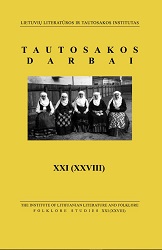TAUTOSAKA SOCIOLOGINIU ŽVILGSNIU
FOLKLORE FROM A SOCIOLOGICAL PERSPECTIVE
Author(s): Bronė StundžienėSubject(s): Cultural history, Customs / Folklore, Music, Sociolinguistics
Published by: Lietuvių literatūros ir tautosakos institutas
Keywords: Folklore; Modern Lithuanian cultural life; tradition; folksongs;
Summary/Abstract: The article presents an attempt to analyze the role of folklore in the modern Lithuanian cultural life from a sociological point of view, with special emphasis on its social intercourse. While recognizing the fact, that among the Lithuanian scholarly disciplines only sociolinguistics has hitherto made some tangible progress in this respect, the author states that folklore researchers still have not developed any strategy of folklore studies, based on sociological and psychological grounds. Admittedly, with regards to the studies of folklore in its social context, the American folklore scholarship is perhaps the most merited one, as it keeps actively developing the contextual analysis of folklore and applying various methods to it. It is high time also for the Lithuanian folklorists to find out, why and what kinds of persons or social groups still need folklore nowadays, i.e. in the period of decline of the ancient folksong tradition. Because of various reasons, only ways of folksong dissemination are in the focus of analysis here, as the most socially resonant. In the sphere of public singing, folklore ensembles are probably among the most active nowadays, unfailingly promoting the most archaic part of the Lithuanian folksong heritage and gathering huge audiences. Thus, in 2005 there were as many as 284 active folklore ensembles in Lithuania, recognized by the specialists as meeting the requirements raised for such singing groups. The author of the article extensively discusses the reasons of the exceptional actualization of the archaic level of folklore nowadays. However, analysis of individual, detached singers (i.e. not belonging to the folk groups), who are the main informants of the fieldwork sessions, reveals quite a different communicative pattern, related to folksongs. In general, as concluded by the author, the active spread of folksongs as well as preserving of Lithuanian identity has nowadays become mainly a concern of the enlightened part of the society, i.e. persons with a higher or other corresponding education.
Journal: Tautosakos darbai
- Issue Year: 2005
- Issue No: 29
- Page Range: 13-22
- Page Count: 10
- Language: Lithuanian

